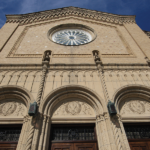After the Illumination Project, churches and other ministries affiliated with the Cooperative Baptist Fellowship are considering whether or not to remain connected to CBF. The crux of the issue for these churches is a change in the CBF hiring policy regarding LGBT individuals.
For some churches on the traditional end of the theological spectrum, the new hiring policy allowing “LGBT individuals to be considered for some staff positions” crosses over to the wrong side of a line of acceptability. For some churches on the progressive end of the theological spectrum, the new hiring policy stops short of the desired level of inclusion. Churches on both sides wonder if they are still in enough agreement to continue to affiliate with the CBF.
As the CBF grapples with the continuing fallout of the Illumination Project, four pastors discussed their church’s continuing connection to the Fellowship during the CBF general assembly in Dallas—Erin Conaway of Seventh and James in Waco; Carol McEntyre of First Baptist in Columbia, Missouri; Mike Oliver of Trinity Baptist in Madison, Alabama; and Alan Redditt of Georgetown Baptist in Georgetown, Kentucky.
Spectrum of positions on sexuality among CBF churches
Each of the four churches represented in the discussion holds a different position on the spectrum between traditional to progressive. The most traditional and progressive of the churches clearly identify their positions. Trinity identifies as traditional and conservative while First Baptist in Columbia identifies as welcoming and affirming. Seventh and James and Georgetown stand between these two on the spectrum.
The historic Baptist principle of local church autonomy guides both Trinity and Georgetown. Both pastors stated unequivocal commitment to their respective churches determining their own descriptors. Oliver said Trinity does not want “anyone outside the church to tell us who we are,” including their local association, the Southern Baptist Convention or the CBF. In describing Georgetown as “welcoming and blank,” Redditt said the church will decide on its own language to fill in the blank.
How churches are reviewing their relationship to CBF
When McEntyre broached the subject of connecting to CBF with the mission team and church council at First Baptist in Columbia, she was told regarding the church’s commitment to CBF: “We’re used to getting kicked out. We don’t leave.” For them, leaving is not an option.
Redditt and Georgetown Baptist began discussing sexuality after the 2015 Obergefell decision in favor of same-sex marriage. They engaged in an extended Bible study on the topic, repeating the study with new deacons prior to the release of the Illumination Project report. As a result, Georgetown decided their position before the report was announced.
Redditt went on to say his church is not in a hurry to conclude its discussion. One reason for their slower deliberation is to observe how they are treated by various Baptist groups and to evaluate their connections based on the level of mercy, grace and respect they receive.
Oliver and Trinity also are deliberate in their discussions. A large portion of Trinity’s congregation is employed by NASA, and those members appreciate measured discussion. As a result, Oliver intentionally has “leaked out information slowly” to allow his congregation to discuss various points thoroughly. In keeping with a slower approach, Oliver and Redditt went over the complete report with their respective congregations.
Sign up for our weekly edition and get all our headlines in your inbox on Thursdays
How churches are answering the funding question
Many churches questioning their continued connection to CBF focus their deliberation on funding. In Texas, this conversation was accelerated when the Executive Board of the Baptist General Convention of Texas announced the removal of CBF as a giving option. As a result, Texas Baptist churches now must send funds directly to CBF.
While Georgetown made no change in its CBF funding, one family concerned about the new CBF hiring policy opted to direct their funds to support CBF missionaries. Notably, this family did not want the church to cut off its financial support of CBF.
First Columbia also continues to fund CBF, in addition to contributing to the Global Missions Offering in support of missionaries sent from their church. The church also funds the Affirming Network breakfast at the CBF general assembly. Their funding choices align with their desire to maintain a connection to their people and their values.
During the question and answer period at the end of the Illumination Project conversation at the general assembly, Tommy Hood, former pastor of Lakeshore Drive Baptist Church in Hudson Oaks outside Weatherford, expressed the concern of his current congregation, Central Baptist in Johnson City, Tennessee, that designations to the Global Missions Offering free up funds for other CBF budget items to which the church may be opposed. Central holds to a traditional and conservative view of marriage and sexuality.
On behalf of Central, Hood asked what other traditional churches are asking, “How can we continue to cooperate [with CBF] in good conscience and maintain our convictions?”
Oliver responded: “You can’t parse every penny. Give it all away.” In support of his response, Oliver used the example of buying gasoline from Exxon. While conservative Christians might not mean to support things like alcohol, do they question what else they may be supporting by doing business with large corporations? At least with CBF, contributions can be designated to support only those things a congregation agrees to support.
But why are churches staying?
Conaway and Oliver both named missions as a significant reason their churches stay connected to CBF. “Historically, Baptists came together to send missionaries,” Conaway said. CBF does missions so well with a unique approach, high quality and “true to the gospel,” said Oliver.
Another reason Conaway named for staying connected to CBF is grace. “Grace is wider than we understand,” said Conaway. “I don’t love any perfect people or organizations, which are made of people.”
Continuing to affiliate with CBF an ongoing discussion
Many wonder how the Illumination Project will affect the future of CBF. That future will be worked out at the local level as each congregation decides for itself whether to remain connected. In making their decision, congregations will need time to consider all the ramifications, including what such a decision will mean for their members who attend or work for convention-related schools and other entities.
Eric Black is the executive director, publisher and editor of the Baptist Standard. He can be reached at [email protected] or on Twitter at @EricBlackBSP.














We seek to connect God’s story and God’s people around the world. To learn more about God’s story, click here.
Send comments and feedback to Eric Black, our editor. For comments to be published, please specify “letter to the editor.” Maximum length for publication is 300 words.